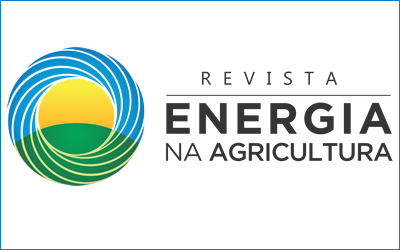AQUEOUS EXTRACT OF RESIDUE FROM THE PROCESSING OF Lentinula edodes IN THE CONTROL OF PHYTOPATOGENIC FUNGI
DOI:
https://doi.org/10.17224/EnergAgric.2022v37n4p23-28Abstract
EXTRATO AQUOSO DE RESÍDUO DO PROCESSAMENTO DE Lentinula edodes NO CONTROLE DE FUNGOS FITOPATOGÊNICOS
NICOLAS AUGUSTO DE CARVALHO FRANCO1, MIRELA MARIA MAGANHA2, OLÍVIA GOMES MARTINS3, LISANDRO DE PROENÇA PIERONI4 E MEIRE CRISTINA ANDRADE CASSIMIRO DA SILVA5
1 Graduando em Engenharia Agronômica, Faculdade Galileu. Av. Marginal 200, 680 - Vila Real, Botucatu - SP, 18606-294, Botucatu, SP, Brasil. E-mail: nicolas.augusto.07@gmail.com
2 Graduada em Engenharia Agronômica, Faculdade Gran Tietê. Av. 15 de Novembro - Centro, Barra Bonita - São Paulo, 17340-000, Barra Bonita, SP, Brasil. E-mail: mirelamaganha@gmail.com
3Doutora em Agronomia – Energia na Agricultura, Faculdade de Ciências Agronômicas, Universidade Estadual Paulista "Julio de Mesquita Filho" (UNESP), Av. Universitária, 3780 - Altos do Paraíso, 18610-034, Botucatu, SP, Brasil. E-mail: oliviagmartins@gmail.com
4 Doutorando em Agronomia – Ciência Florestal, Faculdade de Ciências Agronômicas, Universidade Estadual Paulista "Julio de Mesquita Filho" (UNESP), Av. Universitária, 3780 - Altos do Paraíso, 18610-034, Botucatu, SP, Brasil. E-mail: lisandro.pieroni@unesp.br
5 Docente da Faculdade Galileu. Av. Marginal 200, 680 - Vila Real, Botucatu - SP, 18606-294, Botucatu, SP, Brasil. E-mail: mcnandrade@hotmail.com
RESUMO: Um dos principais custos do agronegócio é os de insumos utilizados no controle fitossanitário, principalmente no controle de doenças. A demanda do agronegócio por soluções sustentáveis faz com que a busca por insumos alternativos seja constante uma vez que, principalmente pequenos produtores, podem se beneficiar destes produtos. Entre essas alternativas está o uso de extratos aquosos fúngicos, do qual muitos possuem substâncias com propriedades antagônicas contra fitopatógenos. O objetivo desse trabalho foi testar a eficiência do extrato aquoso de resíduo do processamento de Lentinula edodes no controle dos fitopatógenos Corynespora sp. (pepino) e Fusarium sp. (alface). A obtenção dos extratos foi realizada com os basidiomas desidratados em pó, misturados em água destilada e incubados a 4ºC por 18 h. Após o período de incubação, a suspensão foi filtrada, centrifugada e o sobrenadante filtrado em membrana tipo Millipore (diâmetro do poro = 0,2 µm). O extrato obtido foi incorporado ao meio de cultivo B.D.A, nas proporções de 0; 1; 2; 3 e 4% (v/v) e no centro de cada placa foi adicionado um disco de micélio de cada fitopatógeno. O delineamento experimental foi em esquema fatorial 2 x 5 (2 fitopatógenos e 5 concentrações), inteiramente casualizado, com 6 repetições. O crescimento micelial foi quantificado e os dados obtidos foram submetidos à análise de variância e as médias comparadas pelo teste de Turkey (5%). De acordo com os resultados o extrato aquoso de L. edodes possui potencial no controle biológico destes fungos, sobretudo de Fusarium sp., em concentrações acima de 2%.
Palavras-chave: controle alternativo, extrato natural, sustentabilidade.
AQUEOUS EXTRACT OF RESIDUE FROM THE PROCESSING OF Lentinula edodes IN THE CONTROL OF PHYTOPATOGENIC FUNGI
ABSTRACT: One of the main costs of agribusiness are the inputs used in phytosanitary control, mainly in disease control. Agribusiness requires alternative solutions with the search for constant inputs, since, mainly, producers can be beneficiaries of these products. Among alternatives is using these aqueous extracts, none of them have substances with antagonistic properties, the objective of this work was to test the efficiency of the aqueous extract of adjustment of these treatments of Lentinula edodes processing and of the processing of fungi, without control of the phytopathogens, Corynespora sp. (cucumber) and Fusarium sp. (lettuce). The extraction was carried out with the basidiomes dehydrated in powder, mixed in distilled water and incubated at 4ºC for 18ºC. After the incubation period, the suspension was filtered, centrifuged and the supernatant type filtered through a Millipore membrane (pore diameter = 0.2µm). The extract obtained was incorporated into the culture medium B.D.A, in the proportions of 0; 1; two; 3 and 4% (v/v) and in the center of each plate a disc of phytopathogenic mycelium was added. The experimental design was in a 2 x 5 factorial scheme (2 fit wasopathogens and 5 were performed), with 6 completely randomized replications. Growth mice and data were selected for analysis of analyzes of analyzes produced by the variance test (5%). According to the results, the aqueous extract of L. e has potential to control these biologicals, especially Fusarium sp., in which it is above 2%.
Keywords: alternative control, natural extract, sustainability.
Published
How to Cite
Issue
Section
License
Copyright (c) 2023 ENERGY IN AGRICULTURE

This work is licensed under a Creative Commons Attribution-NonCommercial-NoDerivatives 4.0 International License.
Esta revista proporciona acesso publico a todo seu conteúdo, seguindo o princípio que tornar gratuito o acesso a pesquisas gera um maior intercâmbio global de conhecimento. Tal acesso está associado a um crescimento da leitura e citação do trabalho de um autor. Para maiores informações sobre esta abordagem, visite Public Knowledge Project, projeto que desenvolveu este sistema para melhorar a qualidade acadêmica e pública da pesquisa, distribuindo o OJS assim como outros software de apoio ao sistema de publicação de acesso público a fontes acadêmicas.





